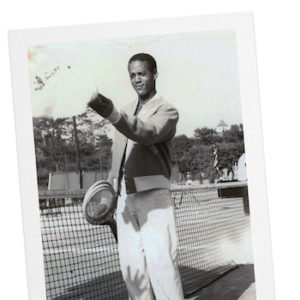
Jimmie McDaniel
*Jimmie McDaniel was born on this date in 1916. He was a Black tennis player.
Raised in Los Angeles, McDaniel attended Manual Arts High School. His father, Willis McDaniel, was a former baseball player in the Negro Leagues who worked as a Pullman porter in Los Angeles; his mother, Ruby, was a domestic worker. Although the only Black player on his high school's tennis squad, McDaniel was the highest-ranked player at the school.
In 1935, McDaniel played Robert "Bobby" Riggs in a practice match while both were still in high school. Riggs was the number one junior player in the country at the match, and McDaniel had only been playing for two years. McDaniel would lose to Riggs in an 11-13 second set. He served two years in reform school when at the age of 18, he got a 15-year-old girl pregnant. He was a lefty and was about 6'5" tall. McDaniel continued his tennis career by winning the 1938 Southern California Men's Singles Open title and sharing the Double's title with his brother Al McDaniel.
Olympian Ralph Metcalfe eventually recruited McDaniel for a track scholarship to the Xavier University of Louisiana in New Orleans, where he soon switched his full efforts to tennis. While at Xavier University, McDaniel would win numerous championships among the then-segregated ranks of black tennis players. Banned from the NCAA Championships, he dominated a Black-college circuit that included schools like Tuskegee, Hampton, and Prairie View. As a freshman in the Spring of 1939, he became the National Open Men's Singles Champion and shared the Doubles title with his schoolmate, Richard Cohen. Between 1939 and 1941, McDaniel would win the Singles title at Prairie View Intercollegiate, the Southwestern Open, the North Carolina Open, the Eastern Sectional Open, the Southern Intercollegiate Sectionals, the New York Open, and the American Tennis Association National Tournament.
Paired with Richard Cohen, they would win the Doubles title at the North Carolina Open, the South Carolina Open, the Eastern Sectional Open, and the New York Open. They would win the National Doubles title in 1939 but were upset in the semi-finals in 1940. Cohen had previously held the title in 1938. McDaniel would again win the National Singles title in 1941. He would finish his collegiate career at Xavier University in 1942.
On July 29, 1940, McDaniel would unofficially break tennis' color barrier by participating in an exhibition match against Don Budge that received wide attention. At the time, The Cosmopolitan Club in Harlem served as the American Tennis Association (ATA) headquarters, home to the nation's Black players, and the Budge-McDaniel exhibition was held there in conjunction with an ATA tournament. For the first time since tennis arrived in the United States six decades earlier, white and black players met in a top-level match. Two-thousand people crammed the club's stands to capacity while others leaned out windows and crowded onto the fire escapes that overlooked the court. Those who didn't have a view could hear the score called on a public-address system. Prominent tennis writer Al Laney was on hand for the occasion, and he praised Budge for "performing an important service for the good of the game." Budge won the match 6–1, 6–2.
Although hailed as a step forward for Black tennis players, it would be another ten years before Althea Gibson took the next step by integrating tennis at the United States National Championships (now the U.S. Open) at Forest Hills in 1950. After the U.S. entered World War II in 1941, Jimmie put tennis aside and moved to Los Angeles to work at a Lockheed Martin aircraft factory. He later worked there as a letter carrier. McDaniel would return to the tennis courts in the late 1950s. By then, he was allowed to walk into white clubs and enter USTA events, and he eventually earned a Top 20 national ranking in the 60-and-overs. McDaniel had at least five children and was married to a woman named Audrey. He was a four-time American Tennis Association singles champion. He was the "greatest black player of the pre-war (WII) era." Jimmie McDaniel died on March 8, 1990.